Addressing Racism: A Reflective Journal for Western Sydney Uni
VerifiedAdded on 2023/06/13
|7
|1661
|320
Journal and Reflective Writing
AI Summary
This reflective journal entry details a Nepalese student's journey in Australia, confronting and overcoming initial cultural biases against Aboriginal people. Influenced by societal stereotypes, the student initially harbored prejudices but, after studying an Aboriginal unit at Western Sydney University, gained a deeper understanding of the history of colonization and the racism faced by native populations. This realization led to feelings of guilt and a commitment to advocate for equitable healthcare access, challenging stereotypes, and promoting culturally safe practices. The reflection emphasizes the importance of cultural competence, including respecting cultural norms like avoiding direct eye contact, building rapport before personal interaction, and utilizing indirect questioning techniques. The student outlines an action plan to integrate these learnings into future healthcare practice, ensuring dignity, autonomy, and culturally sensitive care for Aboriginal patients. The student aims to promote social inclusion and overcome discrimination.
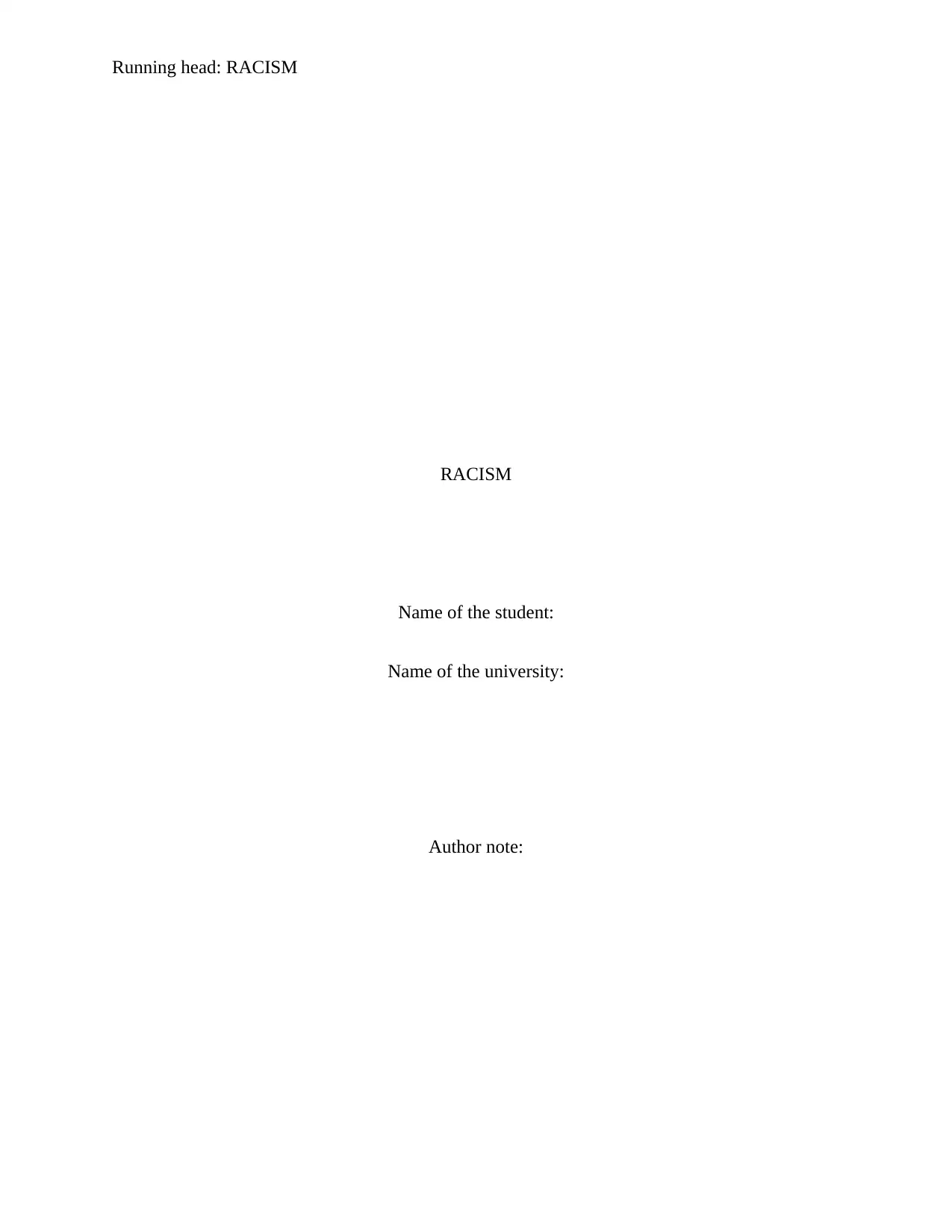
Running head: RACISM
RACISM
Name of the student:
Name of the university:
Author note:
RACISM
Name of the student:
Name of the university:
Author note:
Paraphrase This Document
Need a fresh take? Get an instant paraphrase of this document with our AI Paraphraser
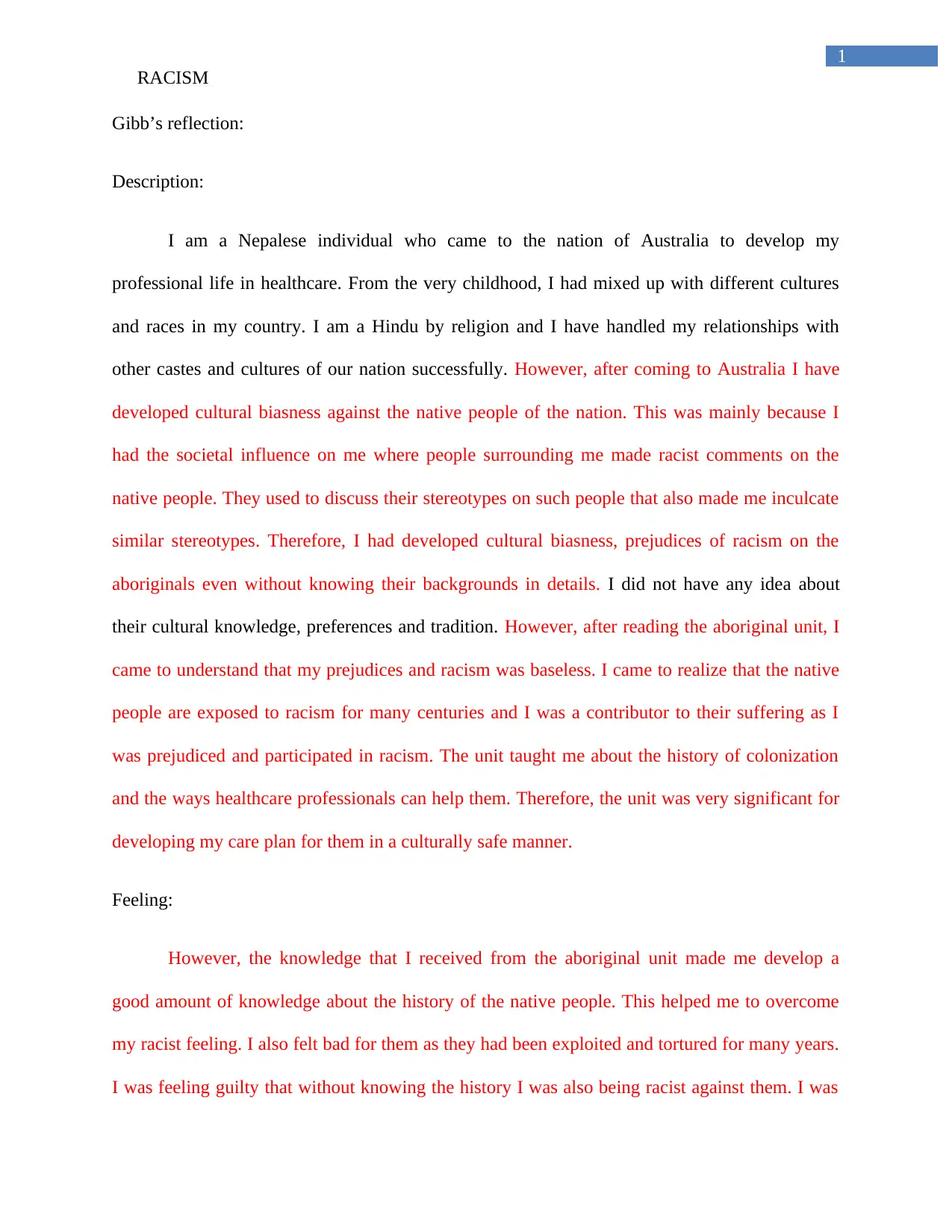
1
RACISM
Gibb’s reflection:
Description:
I am a Nepalese individual who came to the nation of Australia to develop my
professional life in healthcare. From the very childhood, I had mixed up with different cultures
and races in my country. I am a Hindu by religion and I have handled my relationships with
other castes and cultures of our nation successfully. However, after coming to Australia I have
developed cultural biasness against the native people of the nation. This was mainly because I
had the societal influence on me where people surrounding me made racist comments on the
native people. They used to discuss their stereotypes on such people that also made me inculcate
similar stereotypes. Therefore, I had developed cultural biasness, prejudices of racism on the
aboriginals even without knowing their backgrounds in details. I did not have any idea about
their cultural knowledge, preferences and tradition. However, after reading the aboriginal unit, I
came to understand that my prejudices and racism was baseless. I came to realize that the native
people are exposed to racism for many centuries and I was a contributor to their suffering as I
was prejudiced and participated in racism. The unit taught me about the history of colonization
and the ways healthcare professionals can help them. Therefore, the unit was very significant for
developing my care plan for them in a culturally safe manner.
Feeling:
However, the knowledge that I received from the aboriginal unit made me develop a
good amount of knowledge about the history of the native people. This helped me to overcome
my racist feeling. I also felt bad for them as they had been exploited and tortured for many years.
I was feeling guilty that without knowing the history I was also being racist against them. I was
RACISM
Gibb’s reflection:
Description:
I am a Nepalese individual who came to the nation of Australia to develop my
professional life in healthcare. From the very childhood, I had mixed up with different cultures
and races in my country. I am a Hindu by religion and I have handled my relationships with
other castes and cultures of our nation successfully. However, after coming to Australia I have
developed cultural biasness against the native people of the nation. This was mainly because I
had the societal influence on me where people surrounding me made racist comments on the
native people. They used to discuss their stereotypes on such people that also made me inculcate
similar stereotypes. Therefore, I had developed cultural biasness, prejudices of racism on the
aboriginals even without knowing their backgrounds in details. I did not have any idea about
their cultural knowledge, preferences and tradition. However, after reading the aboriginal unit, I
came to understand that my prejudices and racism was baseless. I came to realize that the native
people are exposed to racism for many centuries and I was a contributor to their suffering as I
was prejudiced and participated in racism. The unit taught me about the history of colonization
and the ways healthcare professionals can help them. Therefore, the unit was very significant for
developing my care plan for them in a culturally safe manner.
Feeling:
However, the knowledge that I received from the aboriginal unit made me develop a
good amount of knowledge about the history of the native people. This helped me to overcome
my racist feeling. I also felt bad for them as they had been exploited and tortured for many years.
I was feeling guilty that without knowing the history I was also being racist against them. I was
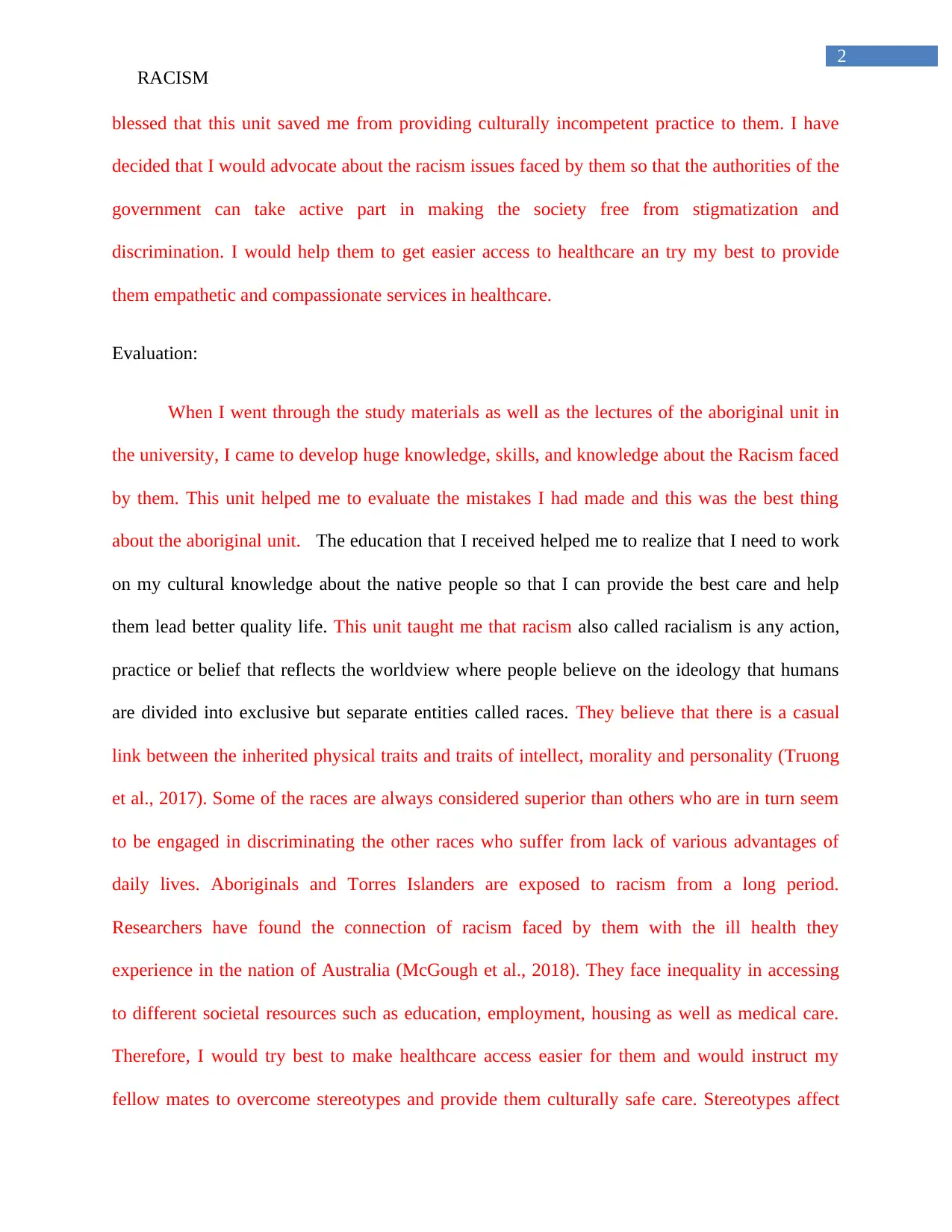
2
RACISM
blessed that this unit saved me from providing culturally incompetent practice to them. I have
decided that I would advocate about the racism issues faced by them so that the authorities of the
government can take active part in making the society free from stigmatization and
discrimination. I would help them to get easier access to healthcare an try my best to provide
them empathetic and compassionate services in healthcare.
Evaluation:
When I went through the study materials as well as the lectures of the aboriginal unit in
the university, I came to develop huge knowledge, skills, and knowledge about the Racism faced
by them. This unit helped me to evaluate the mistakes I had made and this was the best thing
about the aboriginal unit. The education that I received helped me to realize that I need to work
on my cultural knowledge about the native people so that I can provide the best care and help
them lead better quality life. This unit taught me that racism also called racialism is any action,
practice or belief that reflects the worldview where people believe on the ideology that humans
are divided into exclusive but separate entities called races. They believe that there is a casual
link between the inherited physical traits and traits of intellect, morality and personality (Truong
et al., 2017). Some of the races are always considered superior than others who are in turn seem
to be engaged in discriminating the other races who suffer from lack of various advantages of
daily lives. Aboriginals and Torres Islanders are exposed to racism from a long period.
Researchers have found the connection of racism faced by them with the ill health they
experience in the nation of Australia (McGough et al., 2018). They face inequality in accessing
to different societal resources such as education, employment, housing as well as medical care.
Therefore, I would try best to make healthcare access easier for them and would instruct my
fellow mates to overcome stereotypes and provide them culturally safe care. Stereotypes affect
RACISM
blessed that this unit saved me from providing culturally incompetent practice to them. I have
decided that I would advocate about the racism issues faced by them so that the authorities of the
government can take active part in making the society free from stigmatization and
discrimination. I would help them to get easier access to healthcare an try my best to provide
them empathetic and compassionate services in healthcare.
Evaluation:
When I went through the study materials as well as the lectures of the aboriginal unit in
the university, I came to develop huge knowledge, skills, and knowledge about the Racism faced
by them. This unit helped me to evaluate the mistakes I had made and this was the best thing
about the aboriginal unit. The education that I received helped me to realize that I need to work
on my cultural knowledge about the native people so that I can provide the best care and help
them lead better quality life. This unit taught me that racism also called racialism is any action,
practice or belief that reflects the worldview where people believe on the ideology that humans
are divided into exclusive but separate entities called races. They believe that there is a casual
link between the inherited physical traits and traits of intellect, morality and personality (Truong
et al., 2017). Some of the races are always considered superior than others who are in turn seem
to be engaged in discriminating the other races who suffer from lack of various advantages of
daily lives. Aboriginals and Torres Islanders are exposed to racism from a long period.
Researchers have found the connection of racism faced by them with the ill health they
experience in the nation of Australia (McGough et al., 2018). They face inequality in accessing
to different societal resources such as education, employment, housing as well as medical care.
Therefore, I would try best to make healthcare access easier for them and would instruct my
fellow mates to overcome stereotypes and provide them culturally safe care. Stereotypes affect
⊘ This is a preview!⊘
Do you want full access?
Subscribe today to unlock all pages.

Trusted by 1+ million students worldwide
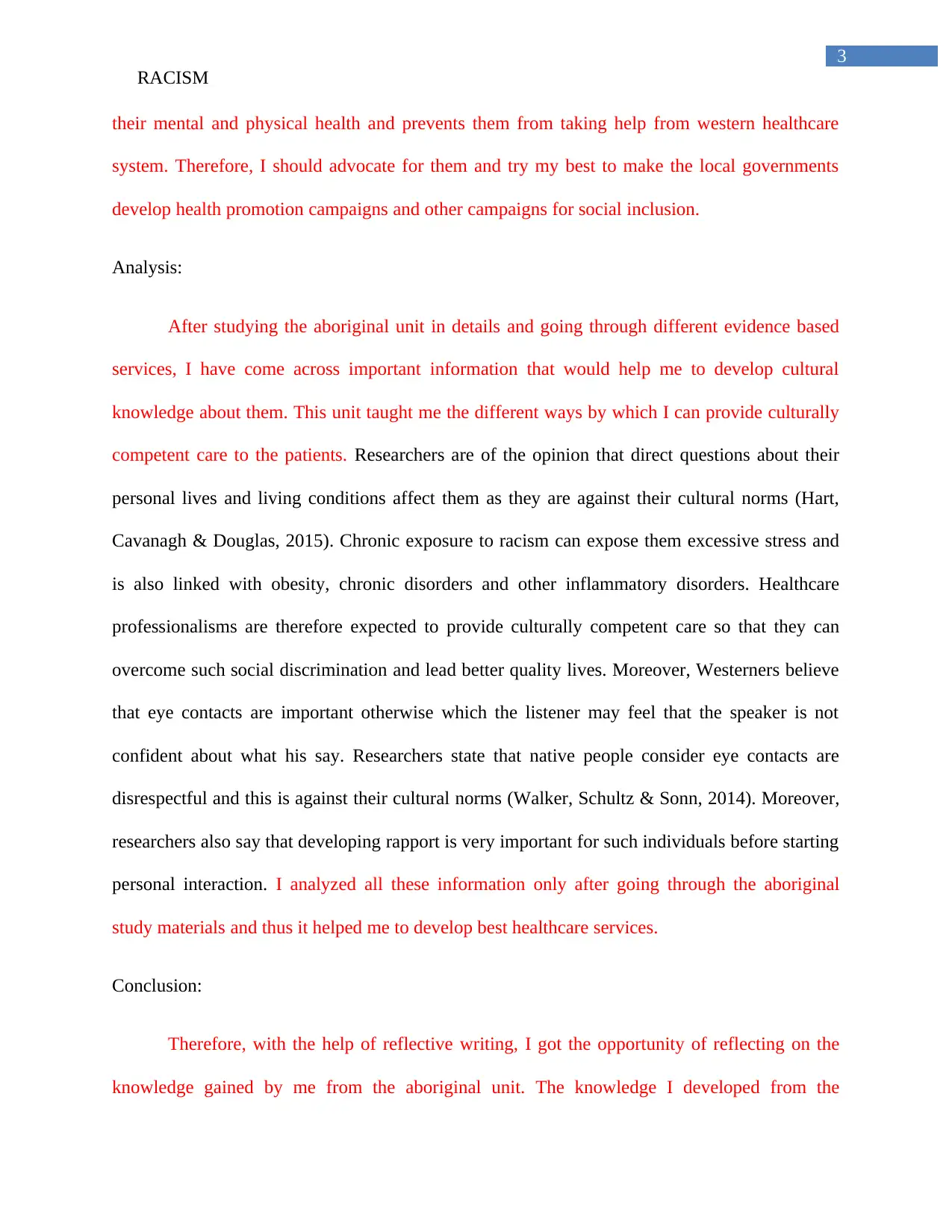
3
RACISM
their mental and physical health and prevents them from taking help from western healthcare
system. Therefore, I should advocate for them and try my best to make the local governments
develop health promotion campaigns and other campaigns for social inclusion.
Analysis:
After studying the aboriginal unit in details and going through different evidence based
services, I have come across important information that would help me to develop cultural
knowledge about them. This unit taught me the different ways by which I can provide culturally
competent care to the patients. Researchers are of the opinion that direct questions about their
personal lives and living conditions affect them as they are against their cultural norms (Hart,
Cavanagh & Douglas, 2015). Chronic exposure to racism can expose them excessive stress and
is also linked with obesity, chronic disorders and other inflammatory disorders. Healthcare
professionalisms are therefore expected to provide culturally competent care so that they can
overcome such social discrimination and lead better quality lives. Moreover, Westerners believe
that eye contacts are important otherwise which the listener may feel that the speaker is not
confident about what his say. Researchers state that native people consider eye contacts are
disrespectful and this is against their cultural norms (Walker, Schultz & Sonn, 2014). Moreover,
researchers also say that developing rapport is very important for such individuals before starting
personal interaction. I analyzed all these information only after going through the aboriginal
study materials and thus it helped me to develop best healthcare services.
Conclusion:
Therefore, with the help of reflective writing, I got the opportunity of reflecting on the
knowledge gained by me from the aboriginal unit. The knowledge I developed from the
RACISM
their mental and physical health and prevents them from taking help from western healthcare
system. Therefore, I should advocate for them and try my best to make the local governments
develop health promotion campaigns and other campaigns for social inclusion.
Analysis:
After studying the aboriginal unit in details and going through different evidence based
services, I have come across important information that would help me to develop cultural
knowledge about them. This unit taught me the different ways by which I can provide culturally
competent care to the patients. Researchers are of the opinion that direct questions about their
personal lives and living conditions affect them as they are against their cultural norms (Hart,
Cavanagh & Douglas, 2015). Chronic exposure to racism can expose them excessive stress and
is also linked with obesity, chronic disorders and other inflammatory disorders. Healthcare
professionalisms are therefore expected to provide culturally competent care so that they can
overcome such social discrimination and lead better quality lives. Moreover, Westerners believe
that eye contacts are important otherwise which the listener may feel that the speaker is not
confident about what his say. Researchers state that native people consider eye contacts are
disrespectful and this is against their cultural norms (Walker, Schultz & Sonn, 2014). Moreover,
researchers also say that developing rapport is very important for such individuals before starting
personal interaction. I analyzed all these information only after going through the aboriginal
study materials and thus it helped me to develop best healthcare services.
Conclusion:
Therefore, with the help of reflective writing, I got the opportunity of reflecting on the
knowledge gained by me from the aboriginal unit. The knowledge I developed from the
Paraphrase This Document
Need a fresh take? Get an instant paraphrase of this document with our AI Paraphraser
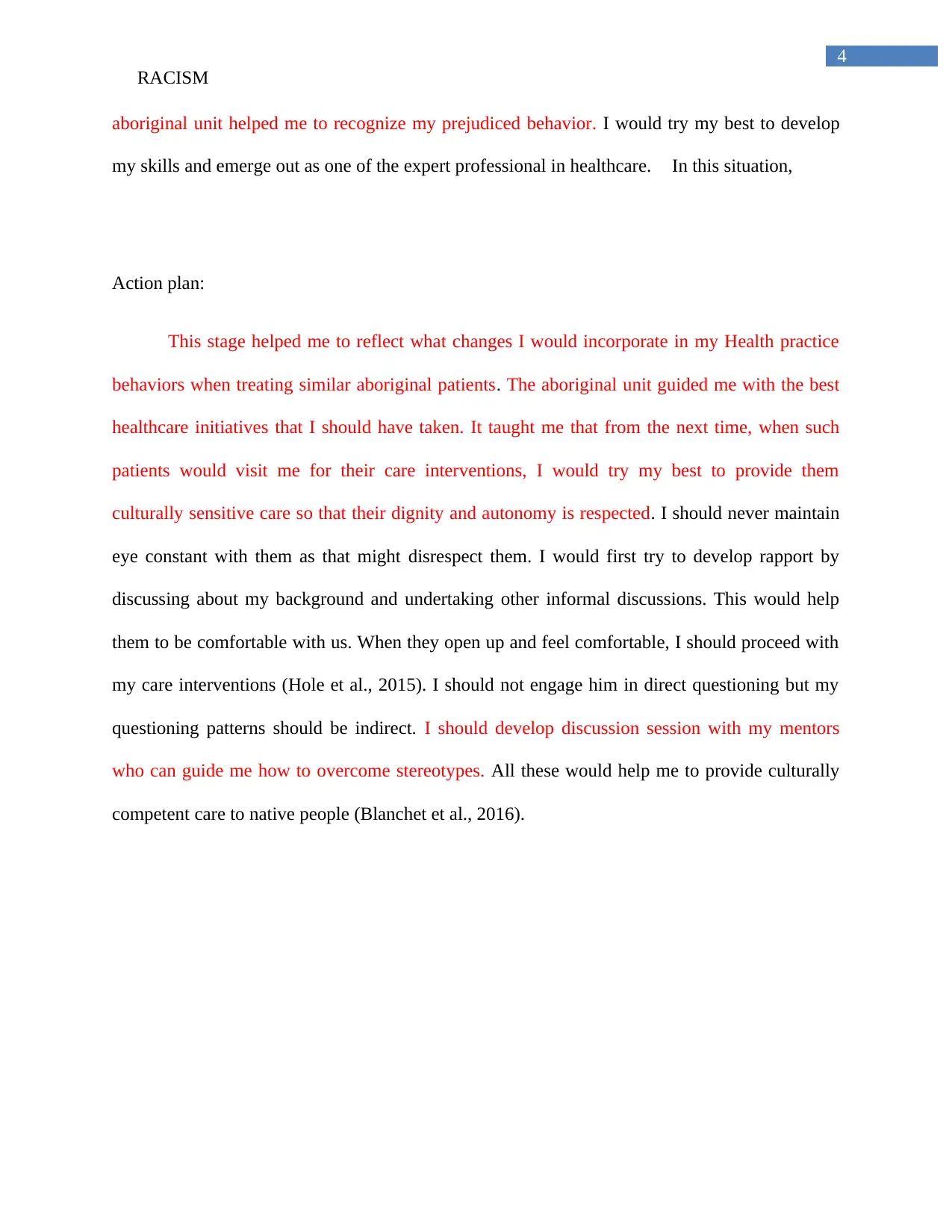
4
RACISM
aboriginal unit helped me to recognize my prejudiced behavior. I would try my best to develop
my skills and emerge out as one of the expert professional in healthcare. In this situation,
Action plan:
This stage helped me to reflect what changes I would incorporate in my Health practice
behaviors when treating similar aboriginal patients. The aboriginal unit guided me with the best
healthcare initiatives that I should have taken. It taught me that from the next time, when such
patients would visit me for their care interventions, I would try my best to provide them
culturally sensitive care so that their dignity and autonomy is respected. I should never maintain
eye constant with them as that might disrespect them. I would first try to develop rapport by
discussing about my background and undertaking other informal discussions. This would help
them to be comfortable with us. When they open up and feel comfortable, I should proceed with
my care interventions (Hole et al., 2015). I should not engage him in direct questioning but my
questioning patterns should be indirect. I should develop discussion session with my mentors
who can guide me how to overcome stereotypes. All these would help me to provide culturally
competent care to native people (Blanchet et al., 2016).
RACISM
aboriginal unit helped me to recognize my prejudiced behavior. I would try my best to develop
my skills and emerge out as one of the expert professional in healthcare. In this situation,
Action plan:
This stage helped me to reflect what changes I would incorporate in my Health practice
behaviors when treating similar aboriginal patients. The aboriginal unit guided me with the best
healthcare initiatives that I should have taken. It taught me that from the next time, when such
patients would visit me for their care interventions, I would try my best to provide them
culturally sensitive care so that their dignity and autonomy is respected. I should never maintain
eye constant with them as that might disrespect them. I would first try to develop rapport by
discussing about my background and undertaking other informal discussions. This would help
them to be comfortable with us. When they open up and feel comfortable, I should proceed with
my care interventions (Hole et al., 2015). I should not engage him in direct questioning but my
questioning patterns should be indirect. I should develop discussion session with my mentors
who can guide me how to overcome stereotypes. All these would help me to provide culturally
competent care to native people (Blanchet et al., 2016).
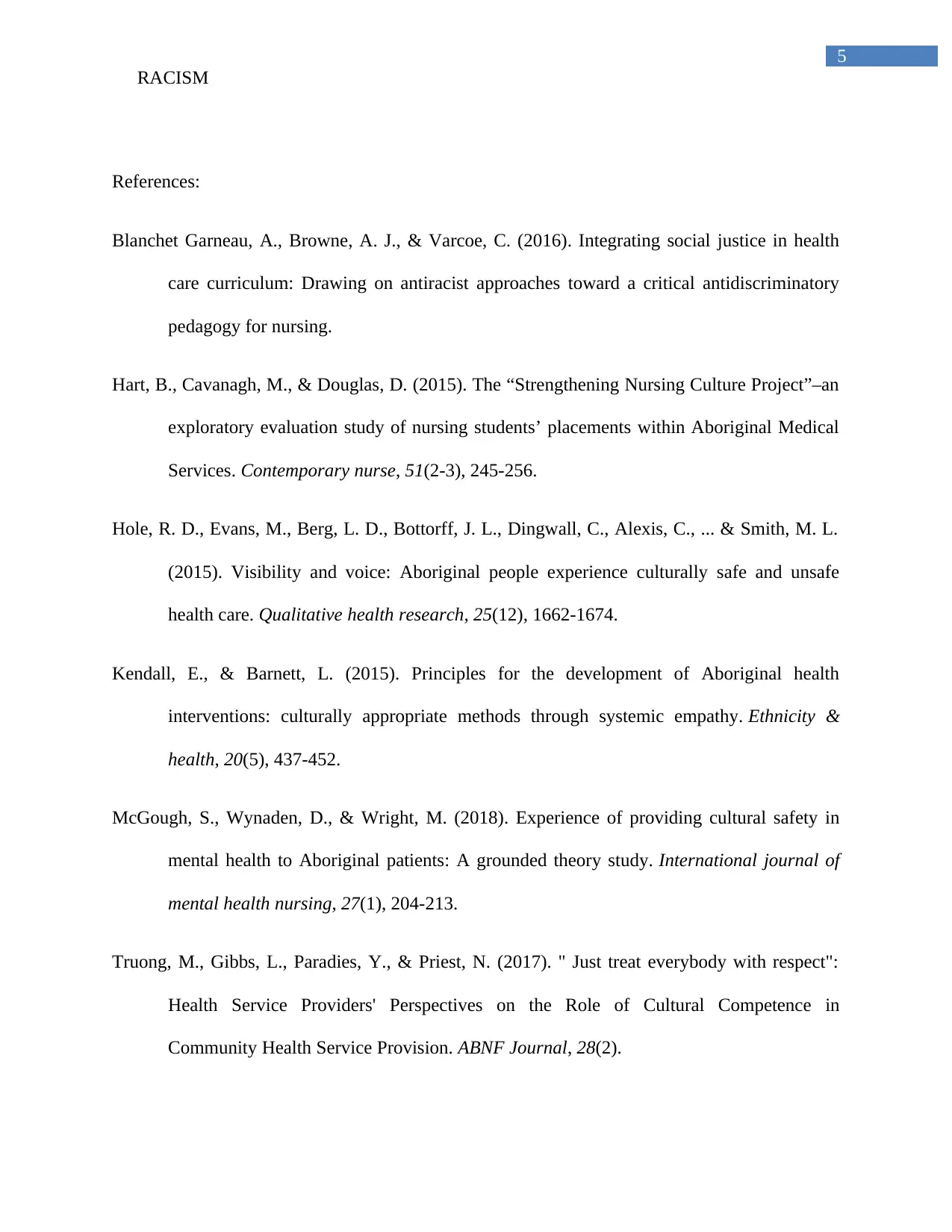
5
RACISM
References:
Blanchet Garneau, A., Browne, A. J., & Varcoe, C. (2016). Integrating social justice in health
care curriculum: Drawing on antiracist approaches toward a critical antidiscriminatory
pedagogy for nursing.
Hart, B., Cavanagh, M., & Douglas, D. (2015). The “Strengthening Nursing Culture Project”–an
exploratory evaluation study of nursing students’ placements within Aboriginal Medical
Services. Contemporary nurse, 51(2-3), 245-256.
Hole, R. D., Evans, M., Berg, L. D., Bottorff, J. L., Dingwall, C., Alexis, C., ... & Smith, M. L.
(2015). Visibility and voice: Aboriginal people experience culturally safe and unsafe
health care. Qualitative health research, 25(12), 1662-1674.
Kendall, E., & Barnett, L. (2015). Principles for the development of Aboriginal health
interventions: culturally appropriate methods through systemic empathy. Ethnicity &
health, 20(5), 437-452.
McGough, S., Wynaden, D., & Wright, M. (2018). Experience of providing cultural safety in
mental health to Aboriginal patients: A grounded theory study. International journal of
mental health nursing, 27(1), 204-213.
Truong, M., Gibbs, L., Paradies, Y., & Priest, N. (2017). " Just treat everybody with respect":
Health Service Providers' Perspectives on the Role of Cultural Competence in
Community Health Service Provision. ABNF Journal, 28(2).
RACISM
References:
Blanchet Garneau, A., Browne, A. J., & Varcoe, C. (2016). Integrating social justice in health
care curriculum: Drawing on antiracist approaches toward a critical antidiscriminatory
pedagogy for nursing.
Hart, B., Cavanagh, M., & Douglas, D. (2015). The “Strengthening Nursing Culture Project”–an
exploratory evaluation study of nursing students’ placements within Aboriginal Medical
Services. Contemporary nurse, 51(2-3), 245-256.
Hole, R. D., Evans, M., Berg, L. D., Bottorff, J. L., Dingwall, C., Alexis, C., ... & Smith, M. L.
(2015). Visibility and voice: Aboriginal people experience culturally safe and unsafe
health care. Qualitative health research, 25(12), 1662-1674.
Kendall, E., & Barnett, L. (2015). Principles for the development of Aboriginal health
interventions: culturally appropriate methods through systemic empathy. Ethnicity &
health, 20(5), 437-452.
McGough, S., Wynaden, D., & Wright, M. (2018). Experience of providing cultural safety in
mental health to Aboriginal patients: A grounded theory study. International journal of
mental health nursing, 27(1), 204-213.
Truong, M., Gibbs, L., Paradies, Y., & Priest, N. (2017). " Just treat everybody with respect":
Health Service Providers' Perspectives on the Role of Cultural Competence in
Community Health Service Provision. ABNF Journal, 28(2).
⊘ This is a preview!⊘
Do you want full access?
Subscribe today to unlock all pages.

Trusted by 1+ million students worldwide
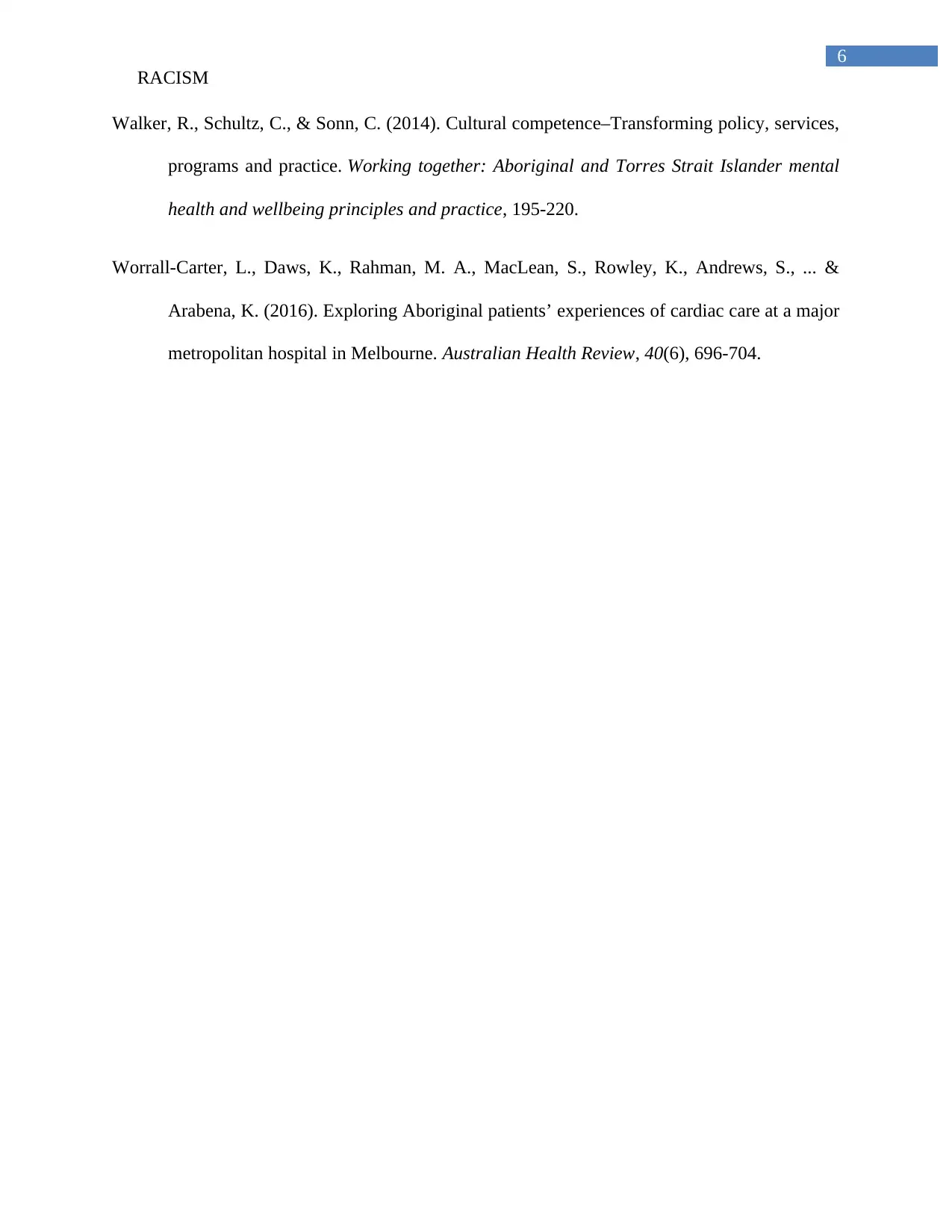
6
RACISM
Walker, R., Schultz, C., & Sonn, C. (2014). Cultural competence–Transforming policy, services,
programs and practice. Working together: Aboriginal and Torres Strait Islander mental
health and wellbeing principles and practice, 195-220.
Worrall-Carter, L., Daws, K., Rahman, M. A., MacLean, S., Rowley, K., Andrews, S., ... &
Arabena, K. (2016). Exploring Aboriginal patients’ experiences of cardiac care at a major
metropolitan hospital in Melbourne. Australian Health Review, 40(6), 696-704.
RACISM
Walker, R., Schultz, C., & Sonn, C. (2014). Cultural competence–Transforming policy, services,
programs and practice. Working together: Aboriginal and Torres Strait Islander mental
health and wellbeing principles and practice, 195-220.
Worrall-Carter, L., Daws, K., Rahman, M. A., MacLean, S., Rowley, K., Andrews, S., ... &
Arabena, K. (2016). Exploring Aboriginal patients’ experiences of cardiac care at a major
metropolitan hospital in Melbourne. Australian Health Review, 40(6), 696-704.
1 out of 7
Related Documents
Your All-in-One AI-Powered Toolkit for Academic Success.
+13062052269
info@desklib.com
Available 24*7 on WhatsApp / Email
![[object Object]](/_next/static/media/star-bottom.7253800d.svg)
Unlock your academic potential
Copyright © 2020–2026 A2Z Services. All Rights Reserved. Developed and managed by ZUCOL.





